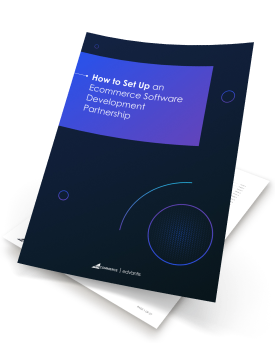
BigCommerce is a robust ecommerce platform equally suited to support smaller- and enterprise-sized retail operations. Because BigCommerce is an Open Saas solution, customization is its strong suit.
Similar to a LEGO set, BigCommerce lets you combine different platform components to power your online retail operations. What’s more, you can also add extra “blocks” from other “sets” (aka third-party products and custom integrations) to get extra operational agility.
Why Open SaaS Platforms Like BigCommerce Offer The Optimal Degree of Customization
Merchants choose to adopt a new ecommerce platform for various reasons — legacy tech constraints, website performance problems, scalability issues, and limited customization.
When it comes to ecommerce store customization, many merchants usually experience two types of issues: The platform can be either too challenging to customize (in the case of open source) or too limiting (in the case of SaaS solutions).
Open-source ecommerce platforms come with almost no limitations on modification. The caveat: most of the customizations require specialized Ecommerce Developers. You have to always budget for development work when you need to make the slightest changes, and most solutions require extensive (and expensive) maintenance.
Case Study
“Mango Bikes switched to BigCommerce from WooCommerce because of customization issues. Their first store required constant Software Developer intervention. There was no sync between all plugins. The merchant said their pre-BigCommerce website was “a patch here and a plugin there.”
On the other end of the spectrum, we have SaaS ecommerce platforms. In this case, you get most of the store functionality — backend architecture, payment processing, and product catalog management tools — natively available out-of-the-box.
Yet, each “block” is less customizable. For instance, you can extend the maximum catalog size beyond the software provider’s upper limit. SaaS platforms retain complete control over the source code so that you can make more drastic changes to the platform’s underlying business logic or technology characteristics.
Case Study
“Carewell re-platformed from Shopify because of limited customization capabilities. The merchant had no control over the checkout and couldn’t develop the frontend locally. The store’s design didn’t align with their needs. It felt like they couldn’t manage the store “their own way.”
Finally, there are Open SaaS platforms like BigCommerce. BigCommerce has many pre-integrated features (core ecommerce functionality). Yet it also exposes 90% of its platform via APIs. This allows a substantial degree of customization.
BigCommerce users can:
- Modify native features (checkout flow, payment processing, etc.)
- Integrate third-party applications and tools
With BigCommerce, you can select pre-made functionality and pair it with other best-of-breed tools your retail business needs. On the backend side, you can scale your store dynamically without worrying about tech debt or service disruptions.
You can customize BigCommerce in two ways: Using available no-code tools and via custom development.
No-Code BigCommerce Store Customization Options
Merchants can customize some elements of the BigCommerce platform without any coding knowledge. But you may be limited by:
- Subscription plans: Some modifications only become available starting from the Plus Plan (e.g., customer segmentation), Pro Plan (e.g., custom product filtering), or Enterprise Plan (e.g., Multi-Storefront).
- Proprietary restrictions: Not all native features are customizable to the extent you want (for instance, you can upload only 20 custom themes to the store).
That said, you can do many design, marketing, and product management tasks without coding. Here are some of them.
Drag-and-Drop Page Builder
Page Builder is a browser-based tool that allows merchants to construct website pages using pre-made widgets (like hero banners, carousels, and product sets), themes, and page layers. You can build beautiful, on-brand product landing pages using graphical controls alone.
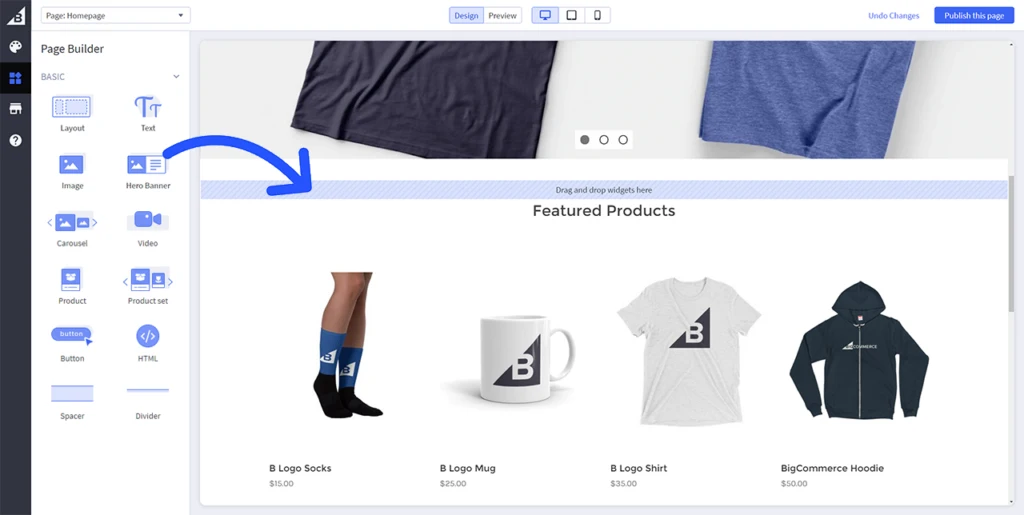
Source: BigCommerce Support
Messaging
Talking to your customers the way they prefer is critical to engaging them. Per a 2021 McKinsey report, at least 66% of consumers expect retailers to tailor messaging around their needs. BigCommerce allows customizing:
- Emails: BigCommerce provides customizable templates for sending transactional and marketing emails (Order Confirmation, Return Requested, etc.).
- Language support: BigCommerce supports seamless translation, but only for some countries. Other times, you’ll need to customize a lang file. And since 40% of users will not buy in a foreign language, this modification is essential.
- Out-of-Stock Message: BigCommerce allows you to replace the generic “Sold Out” message on your product details with an alternative.
- Gift Certificates: You can personalize certificates by selecting the currency, minimum/maximum value, expiration date, recipient’s/sender’s name, etc.
Operational Tasks
Today, 49% of shoppers think retailers should offer promotions and deals specific to past purchases to improve their shopping experience. With BigCommerce, you can easily automate and personalize your promotions (and not only them).
BigCommerce boosts ecommerce operations by customizing:
- Dashboard: The BigCommerce admin panel can be customized for each team to display and hide specific sections. Individual users can customize their dashboards without affecting others.
- Product Fields: Custom product fields come in handy when you have a product with unique parameters. For example, you might want to add team, year, and position attributes if you sell football uniforms.
- Pricing: You can make personalized discounts and coupons available for different customer segments.
Pre-Integrated Apps
BigCommerce also has an ample app marketplace where you can find extra tools for your store and integrate them in several clicks. There is, however, a monthly or yearly fee for using third-party apps.
Popular categories of BigCommerce apps:
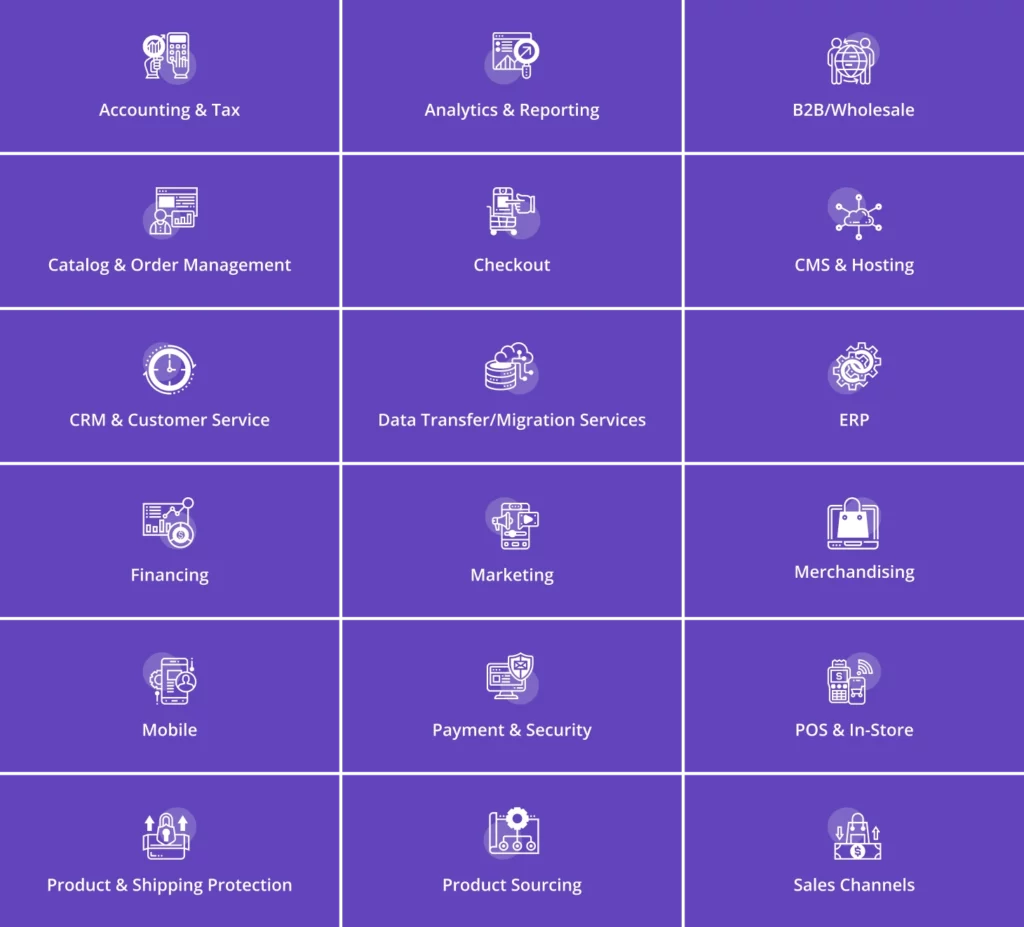
In some cases, an app installation will require several clicks. In more advanced cases, you must follow more complex instructions conveniently created by BigCommerce partners (like this Klarna integration guide).
Nonetheless, if you need more than BigCommerce can provide, it’s time to dial up the Software Developers.
Advanced BigCommerce Customizations
With BigCommerce, you profit from pre-made features but can also use APIs to create your unique shopping experience. Or combine both options.
The significant advantage is that core basic functionality stays with BigCommerce. Adding new features doesn’t cause your store to crash or behave incorrectly — a concern of many merchants with open-source platforms.
Hiring a certified BigCommerce partner allows you to customize the native platform’s features, create new functionality, or establish integrations with third-party products. Here are some options that you may consider.
Checkout Customization
A checkout page is the point where visitors become customers. Unless it’s too complicated: 1 in 6 consumers will abandon online purchases because of a complex checkout process.
Therefore, you should keep your checkout processes simple, frictionless, and logical to prevent abandonment. The Optimized One-Page Checkout from BigCommerce does this well by providing a minimalist design and a set of key checkout fields. And mostly, it’s enough to seal deals for smaller merchants.
However, if you want to succeed in a competitive retail niche, level up your customer experience.
With checkout customization, you can design your checkout in line with your branding, fill it with the right messaging tone, and add custom fields (for example, order delays, signatures, and total savings).
BigCommerce supports the following customizations for the checkout experience:
- Embedded Checkout — a BigCommerce plugin for WordPress that allows users to create a custom checkout flow while still being able to use payment gateways and PCI compliance from the BigCommerce side.
- Custom Checkout — a BigCommerce connector powered by Checkout SDK that lets users replace the default Optimized One-Page Checkout with a custom frontend. PCI compliance here is the responsibility of a merchant.
BigCommerce provides Software Developers with relevant documentation, installation instructions, and code samples to customize checkouts. You can also use checkout SDK to integrate custom payment methods and enable subscription-based payments.
Third-Party Payments
Missed sales opportunities result from a lack of preferred payment methods available to your customers. So, it’s nice to have BigCommerce pre-integrated with many payment methods. But there are still limitations, especially for larger merchants, since
- Most native payment integrations are only available in the USA and Western Europe.
- Some pre-integrated payments support a limited number of currencies.
- Some payment providers don’t have all their features set up on BigCommerce. For instance, they may lack a multi-currency feature, embedded checkout, or the ability to store credit cards.
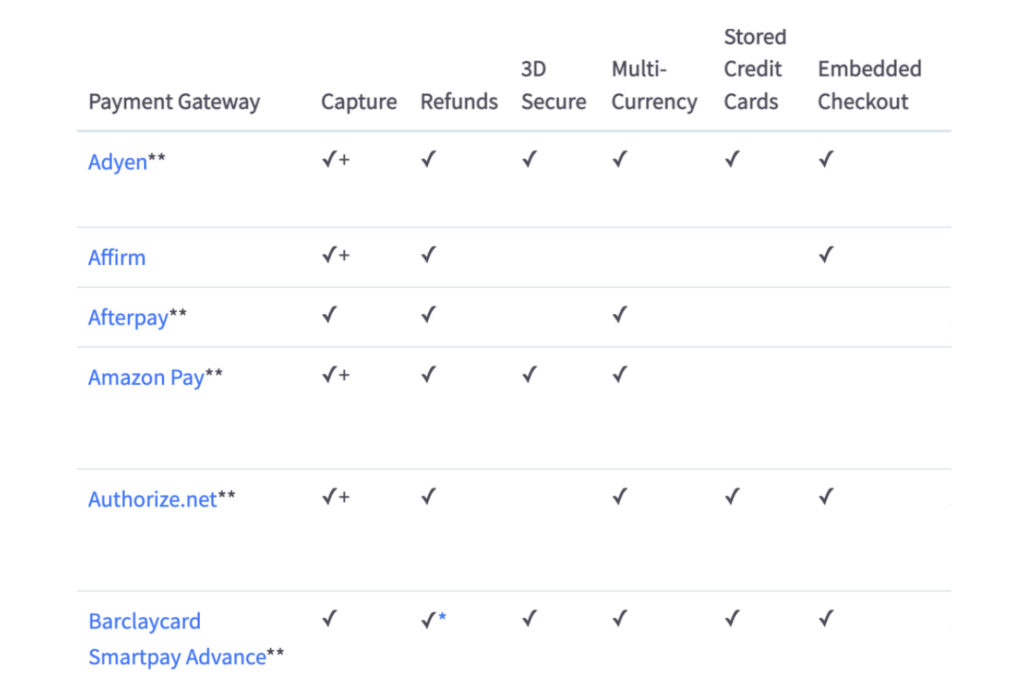
Source: BigCommerce
To integrate a third-party payment, you will need to partner with a tech vendor with extensive experience in payments (especially PCI compliance) and BigCommerce. They will help you ensure the security and functionality of your BigCommerce payment method connector.
Subscriptions
A subscription retail model is gaining traction, allowing brands to gain a loyal client base and a steady revenue inflow.
Customers are picky about payment methods for one-time purchases. Won’t they be even more selective about paying for monthly subscriptions? Yes, that’s why you should offer them a convenient subscription process that works well with their payment methods.
Subscription management apps pre-integrated with BigCommerce may not suit you for many reasons. They may exclude your preferred payment methods, hinder customer experience, or be unavailable in your targeted market.
With Storefront Checkout APIs or headless checkout solutions, your tech partner can integrate relevant subscription management apps. At Edvantis, we also help retailers set up secure and seamless subscription payment processing.
Custom Frontend Design
Headless architecture is a solid option for retailers that want to take complete control over their store’s frontend. It separates the store’s user-facing components from its back-end architecture and transactional features.
Merchants can adjust their UI across multiple channels and markets while BigCommerce handles backend operations.
Unlike monolith architecture, headless allows cherry-picking the best frontend technologies and tools to help you achieve your creative freedom.
Headless vs. Monolith Architecture Comparison
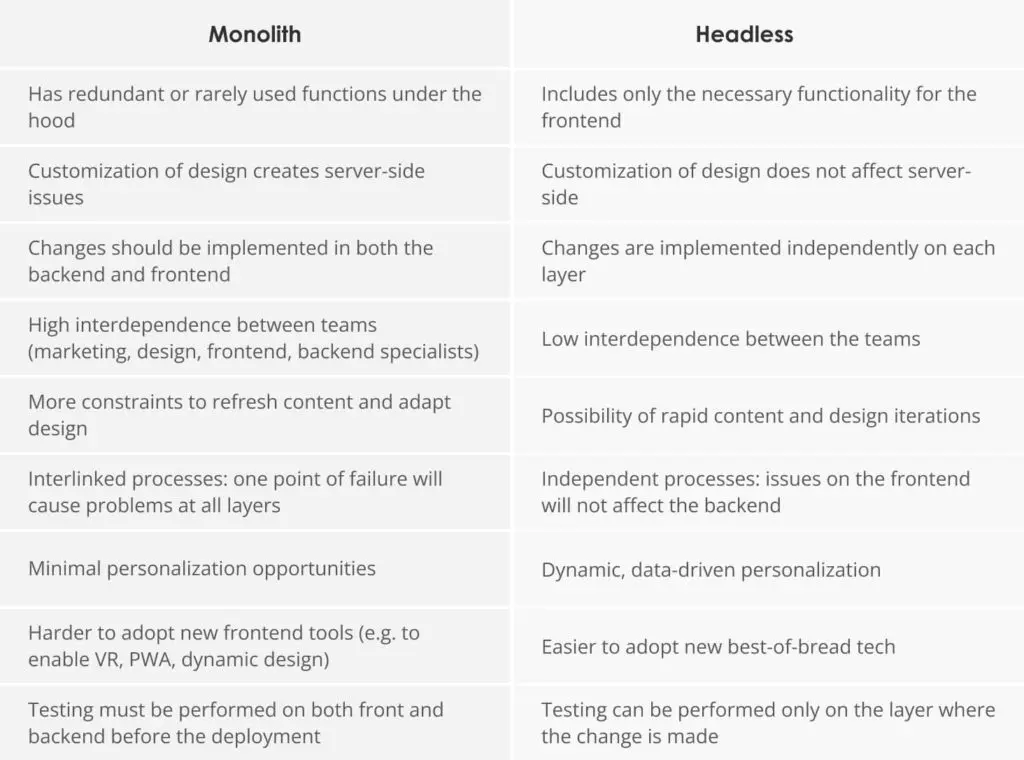
With Headless, merchants can:
- Ensure greater independence between sales, marketing, and development teams
- Enhance customer experience across channels
- Accelerate the development process
- Combine multiple frontend technologies
- Maintain stable and scalable online operations
Suppose you want to establish headless architecture in your store. In this case, you’ll need a tech partner, like Edvantis, with strong UI/UX competency and knowledge of the BigCommerce platform. Edvantis can go even further by providing maintenance of your custom frontend, ensuring no tech issue disturbs your customers on their shopping spree.
Custom Integrations
Connecting your online store to your other business systems helps you get a helicopter view of your operations. You can channel the data you receive from the store into other apps to better understand who you are selling to. Or vice versa, you can configure your tools to enhance your BigCommerce store functionality (e.g., offer better marketing personalization or support omnichannel purchase paths).
Because BigCommerce is API-driven, Software Developers can integrate custom apps through available connectors. You can integrate BigCommerce store such apps:
- Digital Experience Platforms (DXPs) to create personalized shopping experiences
- ERP system to ensure complete visibility of your business
- CRM system to consolidate customer data from stores, apps, and online marketplaces
- 3PL apps to streamline order fulfillment and last-mile logistics
- POS software to seamlessly share and update information between your online, mobile, and brick-and-mortar stores
Custom Data Analytics
Large ecommerce stores generate immense amounts of data spread through multiple locations. Yes, BigCommerce analytics tools can help you analyze a small portion. However, the rest of the data may remain siloed unless you create a unique process for operationalizing your data and designing custom big data models.
At Edvantis, we have experienced data science teams who did just that for our partners.
Custom big data analytics models help you gain insights into your shopper’s behavior, predict customer lifetime value, analyze the path to purchase, and plan inventory accordingly.
Things to Consider for BigCommerce Customization Projects
BigCommerce customization assumes development work, so consider if you have the resources and time to handle the following:
- PCI Compliance: BigCommerce provides full PCI compliance for its pre-integrated payment products. Yet, PCI compliance will depend on you and your vendor if you connect third-party payment solutions.
- BigCommerce partner selection: You’ll need help from an experienced and trustworthy tech vendor with relevant expertise. There are several steps to selecting the right IT vendor: defining your vision, testing your operational readiness, and establishing criteria.
- Operational Readiness: You must have established processes for collaborating with an external vendor
- Requirements refinement: Working with a tech partner does not mean delegating all the work to them and expecting the results back in some time. You will need to refine requirements and provide feedback constantly.
Conclusion
BigCommerce offers lavish out-of-the-box commerce functionality and stable platform performance. You know that your online retail operations are well-secured and optimized for high performance,
However, your business will grow in the long run, and customers’ expectations will rise. You will need more than basic functionality. Combining the BigCommerce API-driven nature and the tech expertise of a seasoned BigCommerce partner, you can:
- Deploy custom frontend designs for different markets/channels.
- Offer more diverse and in-demand payment options.
- Improve operational decision-making with big data analytics.
- Sync and govern all your retail operations from one place.
Your business will be booming. Your competitors will be on their toes, and your customers — eagerly return for another shopping spree with you.
Looking for a BigCommerce-certified and experienced tech partner to aid you with your store customization? Contact Edvantis!

